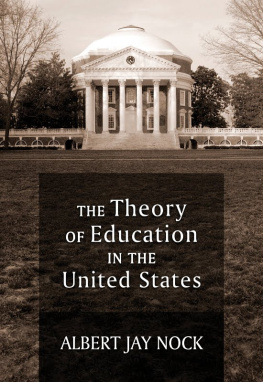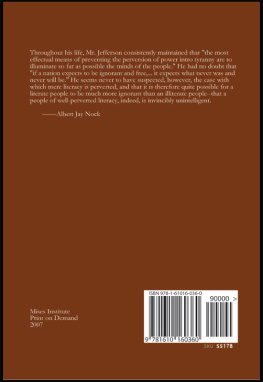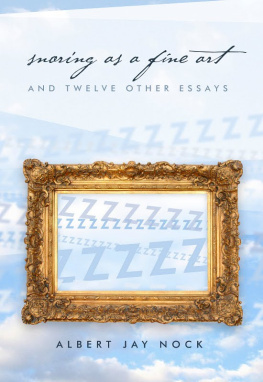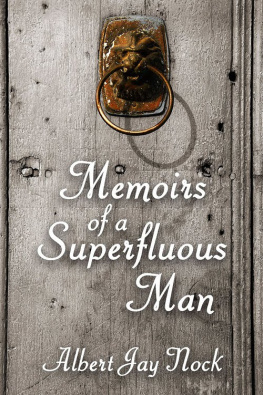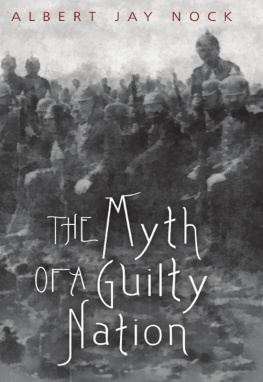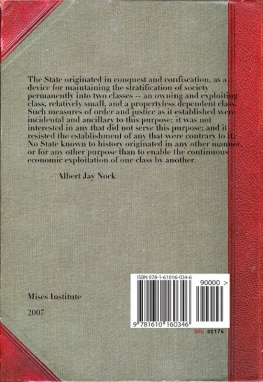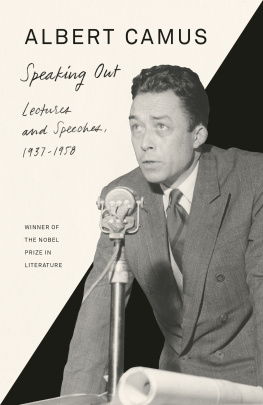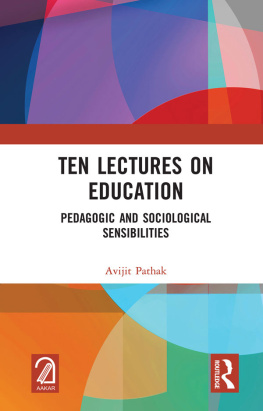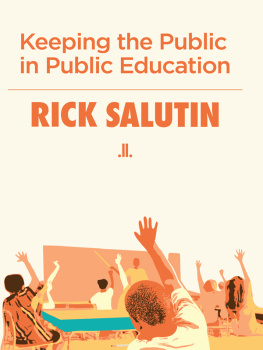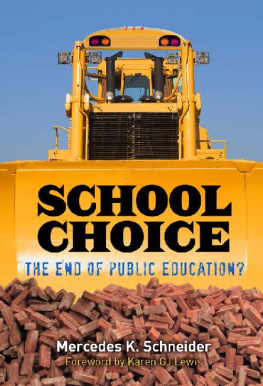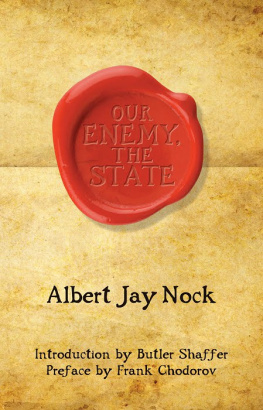THE THEORY OF EDUCATION
IN THE UNITED STATES
BY ALBERT JAY NOCK
THE PAGE-BARBOUR LECTURES FOR 1931
AT THE UNIVERSITY OF VIRGINIA

HARCOURT, BRACE AND COMPANY
NEW YORK

COPYRIGHT, 1932, BY
HARCOURT, BRACE AND COMPANY, INC.
All rights reserved, including
the right to reproduce this book
or portions thereof in any form,
first edition
Typography by Robert S. Josephy
PRINTED IN THE UNITED STATES OF AMERICA
BY QUINN & EODEN COMPANY, INC., RAHWAY, N - J.
PREFACE
T HIS volume is made up of the Lectures delivered last year on the Page-Barbour Foundation, at the University of Virginia. They are threaded together to suit the requirements of publication, but are not much changed otherwise. The style of direct address is now regarded, I believe, as rather out of fashion for the printed page, but I have nevertheless decided, for the most part, to let it stand. I gratefully acknowledge the exquisite hospitality which the whole Academic Body of the University extended to these Lectures. Under the terms of the Foundation, they become, on delivery, the property of the University. Were they still mine, I should be much tempted to offer them as a tribute, inane munus indeed, but the best I have to offer, to the imperishable memory of that faithful and illustrious disciple of the Great Tradition, the Universitys Founder. Since they are quite unworthy of such a distinction, however, I am glad to be spared the pains of resisting that temptation.
ALBERT JAY NOCK.
THE THEORY OF EDUCATION
IN THE UNITED STATES
THE THEORY OF EDUCATION IN THE UNITED STATES
I MAY be permitted to express my great pleasure in the welcome which you have accorded me. I am, of course, very happy to accept it as the official welcome extended to a servant who is borrowed for the occasion by one university from another. I trust, however, that you will allow me to regard it also as the impersonal welcome offered by citizens of the great republic of letters to another citizen whose only credentials and recommendations are those with which his citizenship provides him. I may moreover, I think, be permitted to assume that this impersonal hospitality will be extended to cover the consideration of the subject that I have been appointed to introduce. The constitution of our republic recognises no political boundaries, no distinctions of race or nation; our allegiance to it takes precedence over every local or personal interest. Our business here, I take it, is to consult about matters which seriously affect the welfare of our republic, and I may assume therefore that we are prepared to approach it in no provincial or parochial spirit, but in a truly republican frame of mind, intent only upon the interest to which our first allegiance is due, the interest of the republic of letters.
The subject that I am appointed to discuss is the theory of education in the United States. This discussion has its difficulties. It brings us face to face with a good many serious disappointments. It calls for the re-examination and criticism of a good many matters which seemed comfortably settled, and which we would rather leave undisturbed. The most discouraging difficulty about this discussion, however, is that apparently it cannot lead to any so-called practical conclusion; certainly not to any conclusion, as far as I can see, which will at all answer to the general faith in machinery as an effective substitute for thought, and the general reliance upon machinery alone to bring about any and all forms of social improvement. If Socrates had come before the Athenians with some fine new piece of machinery like a protective tariff, workmens compensation, old-age pensions, collective ownership of the means of production, or what not; if he had told them that what they must do to be saved was simply to install his piece of machinery forthwith, and set it going; no doubt he would have interested a number of people, perhaps enough to put him in office as the standard-bearer of an enlightened and progressive liberalism. When he came before them, however, with nothing to say but Know thyself, they found his discourse unsatisfactory, and became impatient with him. So if a discussion of our educational theory could be made to lead to something that we might call constructivethat is to say, something that is immediately and mechanically practicable, like honour schools or a new type of housing or a new style of entrance examinationsone might hope to make it rather easily acceptable. There seems no way to do this. The only large reforms indicated by a thorough discussion of the topic are such as must be put down at once as quite impracticable on general grounds, and the minor mechanical changes that are indicated seem also impracticable on special grounds, besides having the appearance of uncertain value and therefore being unlikely to command interest. Yet notwithstanding this rather barren prospect for our discussion, one thing may perhaps redeem it from absolute sterility; which is that we are presumably always better off for knowing just where we are, and for being able to identify and measure the forces which are at play upon us. I do not wish to adduce too depressing a parallel in saying that diagnosis has value even in a hopeless case. Hopelessness in many cases, for instance in cases of incipient tuberculosis, as you know, is circumstantial, and circumstances may change; it is almost never flatly impossible that they should change. Diagnosis, then, has obvious value when it shows only that in those circumstances the case is hopeless; and even when it reveals the case as hopeless in any circumstances, it affords at least the melancholy satisfaction of knowing just where one stands.
We may observe then, in the first place, that our educational system has always been the object of strong adverse criticism. No one has ever been especially well satisfied with it, or well pleased with the way it worked; no one, I mean, whose opinion was at the same time informed and disinterested, and therefore worth attention. Late in the last century, Ernest Renan said that countries which, like the United States, have set up a considerable popular instruction without any serious higher education, will long have to expiate their error by their intellectual mediocrity, the vulgarity of their manners, their superficial spirit, their failure in general intelligence. This is very hard language, and I do not propose, for the moment, that we should undertake to say how far its severity may be fairly regarded as justifiable. I may, however, ask you to notice two things; first, the distinction which M. Renan draws between instruction and education, and second, his use of the word intelligence. We shall not lay down a definition of education in set terms here at the outset of our discussion; I think it would be more satisfactory if, with your permission, we should gradually work towards the expression of our idea of what education is, and of what an educated person is like. It is sometimes, indeed often, difficult to construct in set terms the definition of an object which we nevertheless recognise at once for what it is, and about which we have no possible manner of doubt. I could not to save my life, for instance, make a definition of an oyster; yet I am sure I know an oyster when I see one. Moreover, in looking at an oyster, I can point out a number of differentiations, more or less rough and superficial, perhaps, but quite valid in helping to determine my knowledge. So in gradually building up an expression of our idea of education, we find the distinction drawn by M. Renan especially useful. Perhaps we are not fully aware of the extent to which instruction and education are accepted as being essentially the same thing. I think you would find, if you looked into it, for instance, that all the formal qualifications for a teachers position rest on this understanding. A candidate is certificatedis he not?merely as having been exposed satisfactorily to a certain kind of instruction for a certain length of time, and therefore he is assumed eligible to a position which we all agree that only an educated person should fill. Yet he may not be at all an educated person, but only an instructed person. We have seen many such, and five minutes talk with one of them is quite enough to show that the understanding of instruction as synonymous with education is erroneous. They are by no means the same thing. Let us go no further at present in trying to determine what education is, but merely take note that it is not the same thing as instruction. Let us keep that differentiation in mind, never losing sight of it for a moment, and considering carefully every point in the practice of pedagogy at which it is applicable. If we do this, I venture to predict that we shall turn up an astonishing number of such points, and that our views of current pedagogy will be very considerably modified in consequence. An educated man must be in some sort instructed; but it is a mere
Next page
